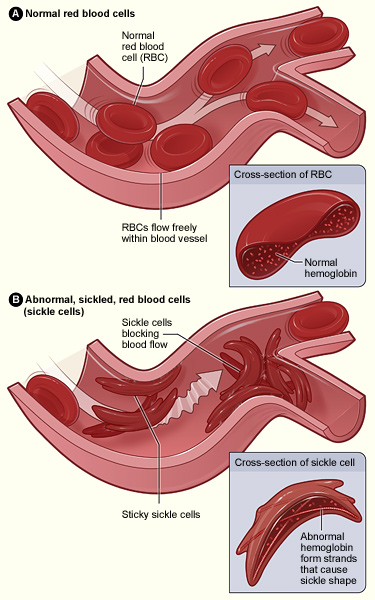
I recently read about a very sensitive issue in an article on Vanguard Newspaper relating to sickle cell patients and how technology can be used as a measure. Even as i read through all i could think of was the amout of people that are affected by sickle cell and the pain they go through each day.Imagine an environment like ours where health care is not given attention, how do children survive the pain especially when they come from poor homes.
This was addressed by Dr. Godwin Bazuaye who is a consultant dermatologist and specialist in bone marrow transplants. He graduated from the University of Benin and trained in the same school. He later went to Switzerland for sub-specialization in bone marrow transplantation. Currently, he is head of Human Dermatology and Co-ordinator of Stem Cell Transplant Unit at the University of Benin Teaching Hospital, UBTH.
He recently stated how the hospital successfully completed two stem cell transplants and how Nigerians can benefit from the technology locally, rather than going abroad to change their genotype, especially sickle cell patients. The body accept new cells to be transplanted. In this unit, you can change the genotype of a child or an individual from sickle cell to AA. You bring a primitive cell from a donor to a recipient. Before this time, you would have reduced the immunity in the patient to the barest minimum so that he can accept what you are giving to him, called stem cell. It can also be used for cancer patients. Major beneficiaries are sickle cell patients. Once it is done, they are no longer sicklers.
Similarly, they don’t collect blood from the veins; needle is used on the bone marrow to bring out blood. Usually, the risk is very minimal. To the donor, there is no risk in the procedure, except the risk that has to do with going to the theatre. Apparently, the last patient was a 14 year-old boy. By the third day, he had gone home and he resumed school the next day. For the patient, the risk is very low, as it has to do with the hard drugs, which the body could react to. For the patient, they are placed on very high drugs in the course of destroying the bone marrow. It could lead to side effects reaction.
The therapy is used for both the sickle cell and blood cancer patients; in fact, anything that has to do with taking a cell from a donor to cure the patient. Really, for sickle cell patients, it is preferable when they are 15 years and below because when they are older, they tend to need a lot of blood transfusion, their organs may get damaged. Although, there is a new method we use for adult sickle cell patients; that is also to change their genotype to AS.
The only problem i have is with the cost of the treatment which he stated on the average, costs between N8m-N6m, depending on the number of supportive care. If there is support of the Federal Government in the way of subsidising the equipments in a space that is big enough to take five to10 people at a time, then it will reduce the cost.
Although the procedure takes an average of three months or 100 days because at that period, you have a lot of tests and checks involved, though some may be discharged before one hundred days.
The therapy is good for both sickle cell and anything that has to do with cell transplant. This is the first in West Africa and third in the whole of Africa, after Egypt and South Africa. This can be replicated in the six geo-political zones. India for instance, has about 20 centres. An average of N1 billion should be able to set up a centre.
THIS IS HONESTLY A BRILLIANT DEVELOPMENT. WHAT DO YOU THINK?



No comments:
Post a Comment